
Sid Meier's Civilization is a 1991 turn-based strategy 4X video game developed and published by MicroProse. The game was originally developed for MS-DOS running on a PC, and it has undergone numerous revisions for various platforms. The player is tasked with leading an entire human civilization over the course of several millennia by controlling various areas such as urban development, exploration, government, trade, research, and military. The player can control individual units and advance the exploration, conquest and settlement of the game's world. The player can also make such decisions as setting forms of government, tax rates and research priorities. The player's civilization is in competition with other computer-controlled civilizations, with which the player can enter diplomatic relationships that can either end in alliances or lead to war.

Freeciv is a single- and multiplayer turn-based strategy game for workstations and personal computers inspired by the proprietary Sid Meier's Civilization series. It is available for most desktop computer operating systems and available in an online browser version. Released under the GNU GPL-2.0-or-later, Freeciv is free and open-source software. The game's default settings are closest to Civilization II, in both gameplay and graphics, including the units and the isometric grid. However, with a lot of multiplayer games being played in longturn communities, rulesets and additional variants have evolved away from the original ruleset. Freeciv is playable online at Longturn.net, freecivx.net, freecivweb.org and some temporary private servers.

Sid Meier's Civilization II is a turn-based strategy video game in the Civilization series, developed and published by MicroProse. It was released in 1996 for PCs, and later ported to the PlayStation by Activision.

Sid Meier's Civilization III is the third installment of the Sid Meier's Civilization turn-based strategy video game series. It was released in 2001, and followed by Civilization IV. Unlike the original game, Civilization III was not designed by Sid Meier, but by Jeff Briggs, a game designer, and Soren Johnson, a game programmer.

Rise of Nations is a real-time strategy video game developed by Big Huge Games and published by Microsoft Game Studios in May 2003. Designed as a fusion of concepts from turn-based strategy games with the real-time strategy genre, the game's development was led by Brian Reynolds, who founded Big Huge Games following his involvement in the development of the turn-based strategy games Civilization II and Sid Meier's Alpha Centauri. In contrast to previous historical real-time strategy games, Rise of Nations is based on the entirety of history, taking place from the ancient era to the modern age, and features eighteen civilizations, playable across eight ages of world history. The game features several innovations on the real-time strategy genre, introducing novel features such as territory and attrition influenced by the turn-based strategy genre.

Caesar is a 1992 city-building video game published by Sierra On-Line in which the player undertakes the role of a Roman governor, building ancient Roman cities.

4X is a subgenre of strategy-based computer and board games, and includes both turn-based and real-time strategy titles. The gameplay generally involves building an empire. Emphasis is placed upon economic and technological development, as well as a range of military and non-military routes to supremacy.
Impressions Games was a British video game developer founded by David Lester. He sold the company to Sierra On-Line in 1995, who was then bought out by Cendant and eventually, Vivendi Universal.
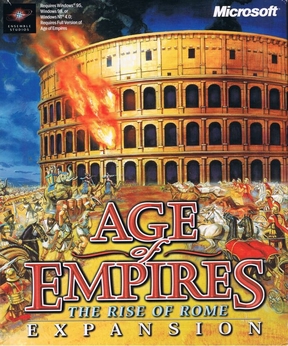
Age of Empires: The Rise of Rome is a 1998 expansion pack for the 1997 real-time strategy video game Age of Empires, developed by Ensemble Studios for Windows and published by Microsoft. The expansion adds four new playable civilizations, including the Romans, as well as new units, map types and minor improvements to the game. Development of The Rise of Rome was prompted by delays to the creation of a sequel, Age of Empires II: The Age of Kings, leading to Ensemble Studios creating an expansion to maintain sales of the original game. Upon release, The Rise of Rome was commercially successful and received positive reviews from critics, with praise directed to the expansion's inclusion of features and gameplay mechanics beyond the expected addition of new maps. Reviewers later expressed that the expansion set the standard for the sequel to Age of Empires II, The Conquerors, released in 2000.

Civilization IV is a 4X turn-based strategy computer game and the fourth installment of the Civilization series, and developed by Firaxis Games. It was designed by Soren Johnson. It was released in North America, Europe, and Australia, between October 25 and November 4, 2005, and followed by Civilization V.

Empires: Dawn of the Modern World is a 2003 real-time strategy video game developed by Stainless Steel Studios and published by Activision. Set in a world-historical period that extends from the Middle Ages to World War II, the game tasks players with guiding one of nine rival great civilizations to victory. The game contains both a single player campaign as well as multiplayer gameplay mode.

Caesar III is a city-building game released on September 30, 1998, for Microsoft Windows and Mac OS, developed by Impressions Games and published by Sierra On-Line. It is the third installment of the Caesar series of games and is part of Sierra's City Building series. Players assume the role of a provincial governor to build thriving cities across the Roman Empire, in which they must ensure their citizens have their needs met, and deal with various disasters, angry gods and hostile enemies. The developers of Caesar III designed the game in response to critiques of its predecessor, introducing branching missions, a merged map for city-building and combat, and a "walker" mechanic for citizens of the city to affect their surroundings. Caesar III was released to positive critical reception, with praise directed at the game's visual presentation and complex design, and criticism levelled at its military features.
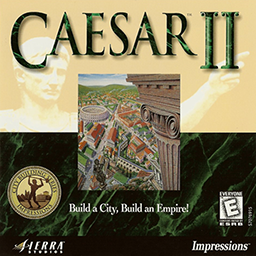
Caesar II is a 1995 video game of the Caesar video game series that takes place in Ancient Rome. It is the second game in the City Building series.

CivCity: Rome is a city building strategy game by Firefly Studios and Firaxis Games. It includes elements from two game series, Caesar and Civilization.

Conquest of the New World is a video game produced by Interplay Productions and released in 1996. It is a strategy game, involving one or more players either by hotseat, on LAN, modem, or even PBEM (play-by-email). The game starts in the year 1493 and deals with the discovery and conquest of the Americas.
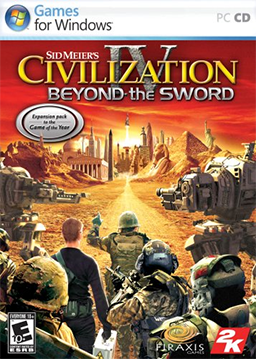
Sid Meier's Civilization IV: Beyond the Sword is the second expansion pack of the turn-based strategy video game Civilization IV. The expansion focuses on adding content to the in-game time periods following the invention of gunpowder, and includes more general content such as 11 new scenarios, 10 new civilizations, and 16 new leaders.
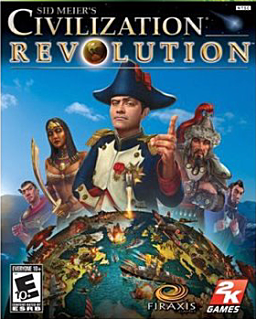
Sid Meier's Civilization Revolution is a 4X, turn-based strategy game developed in 2008 by Firaxis Games with Sid Meier as designer. It is a spin-off of the Civilization series. The video game was released for the PlayStation 3, Xbox 360, Nintendo DS, Windows Phone, and iOS. A Wii version was originally expected but was cancelled. The absence of a PlayStation Portable version was attributed to a lack of development manpower.

Sid Meier's Civilization V is a 4X turn-based strategy video game in the Civilization series developed by Firaxis Games. The game was released for Windows in September 2010, for Mac OS X on November 23, 2010, and for Linux on June 10, 2014.

Age of Empires (AoE) is a real-time strategy video game based on history, developed by Ensemble Studios and published by Microsoft, and the first game in the Age of Empires series. The game uses the Genie Engine, a 2D sprite-based game engine. The game allows the user to act as the leader of an ancient civilization by advancing it through four ages, gaining access to new and improved units with each advance.
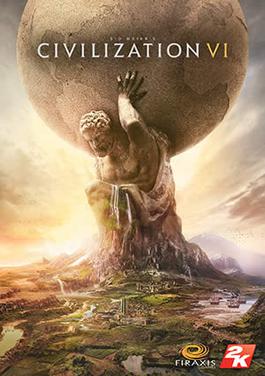
Sid Meier's Civilization VI is a turn-based strategy 4X video game developed by Firaxis Games and published by 2K. The mobile and Nintendo Switch port was published by Aspyr Media. The latest entry into the Civilization series, it was released on Windows and macOS in October 2016, with later ports for Linux in February 2017, iOS in December 2017, Nintendo Switch in November 2018, PlayStation 4 and Xbox One in November 2019, and Android in 2020.



















